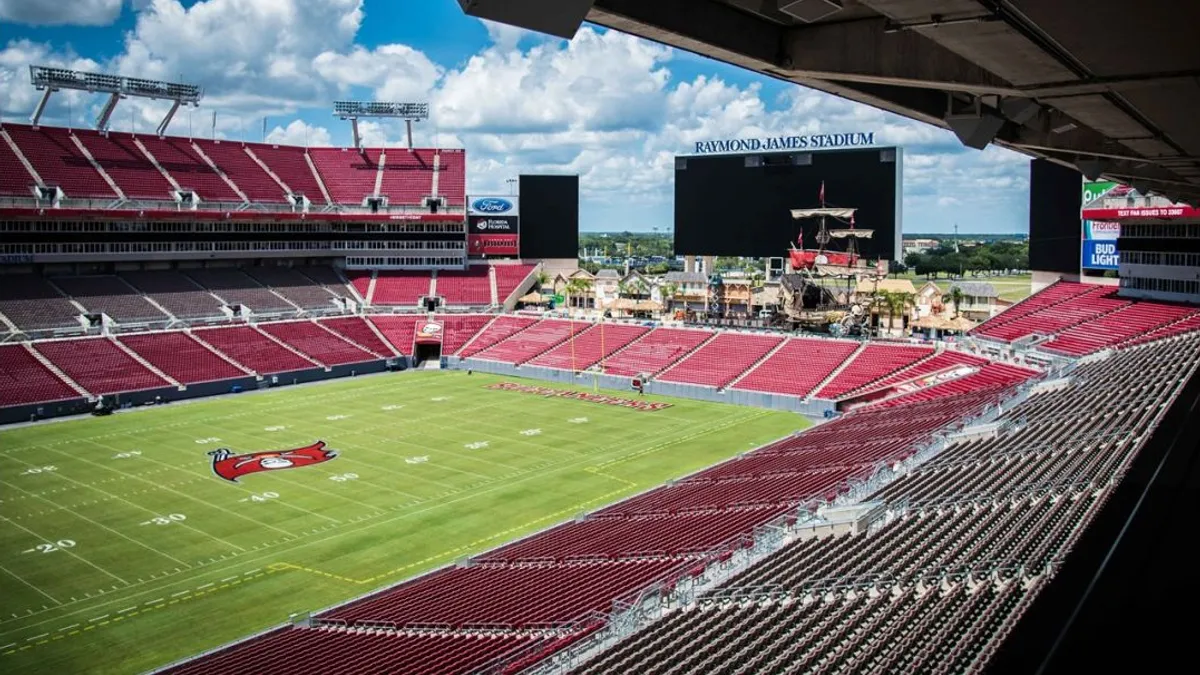On Sunday, the Tampa Bay Buccaneers will be the first NFL team ever to host a Super Bowl in their home stadium, as they face the reigning champion Kansas City Chiefs.
Cities that host the big game often spend months or years before the event sprucing up their stadiums, lodging and other infrastructure in order to roll out the red carpet to the thousands of football fans that descend for the big game.
New projects in Tampa Bay have sprung up, while existing structures have received upgrades. Although the experience will certainly be different due to reduced crowds as a result of the coronavirus, here is a look at some of the major projects around this year's Super Bowl.
Raymond James Stadium
This will be the third time Raymond James Stadium, which was finished in 1998, has hosted the Super Bowl, and the fifth time for the city of Tampa.
When the city was selected in 2017 to host this year's Super Bowl, the Buccaneers’ ownership and the Tampa Sports Authority kicked off a four-year process to upgrade the stadium’s amenities at a cost of $160 million, according to Forbes. Renovations included:
- An upgraded field drainage system.
- LED lighting.
- New high-definition video boards.
- A new sound system.
- Enhanced Wi-Fi.
- 5G technology extending to the parking lot.
- Previously planned enhancements like new seatbacks, upgraded concession areas, expansion of in-stadium stores and renovations to suites.
The sports authority also secured $10.4 million in funds from the Coronavirus Aid, Relief, and Economic Security Act to overhaul COVID-19 safety at the stadium, including an entirely cashless payment system, touchless restroom features, hundreds of hand sanitizers and social distancing measures at concourses, Forbes reported.
About $4 million of the funds were diverted to use in Hillsborough County, the area around the stadium, according to Forbes. The Super Bowl Experience, a seven-day event that includes live music, food and football-related activities, is being held at multiple parks along the 2.7-mile Tampa Riverwalk.
And on Sunday, 22,000 fans will be admitted to the stadium, which can normally hold up to 65,618. Of those fans, 7,500 will be vaccinated healthcare workers, who will receive all expenses paid trips to Tampa.
Tampa International Airport
To handle the influx of football fans, the Tampa International Airport recently completed a series of renovations dating back to 2011. The first phase, which was mostly finished in 2018, helped to relieve congestion along the curbs and roadside outside the terminal.
In 2019, the airport broke ground on Phase 2 of the project, which has multiple components. The largest two are further curbside expansion work from Hensel Phelps — which includes 16 new express lanes exclusively for passengers without checked luggage — and a 35-acre commercial development, dubbed the SkyCenter, next to the Rental Car Center.
The SkyCenter development includes a nine-story office building from general contractor J.E. Dunn, a new commercial curb and an atrium connecting the development to the Rental Car Center. Future plans will include a convenience store, gas station and hotel.
The $690-million third phase of the project will include construction of a new Airside D, with 16 new gates for domestic and international flights. The start date for Phase 3 was pushed back, due to COVID-19.
JW Marriott Tampa Water Street
On Feb. 3, just four days before the Super Bowl, JW Marriott — the luxury hotel brand of the Marriott hotel chain — announced the opening of the JW Marriott Tampa Water Street, the 100th JW Marriott location worldwide and the first in the city. Designed by Nichols Brosch Wurst Wolfe & Associates, the hotel has 519 rooms, a four-story atrium lobby and a floating conference room called “Skybox.” Construction on the hotel began in early 2018.
The hotel is about a 15-minute drive from Raymond James Stadium, but is right next door to the Tampa Convention Center and Amalie Arena — home to the NHL’s Tampa Bay Lightning. The JW Marriott features 100,000 square feet of meeting and event space, and is connected to the Tampa Marriott across the street by a glass skybridge.
Hotel officials outlined COVID-19 safety protocols, to include face covering requirements, plexiglass shields at reception and higher frequency cleaning.














